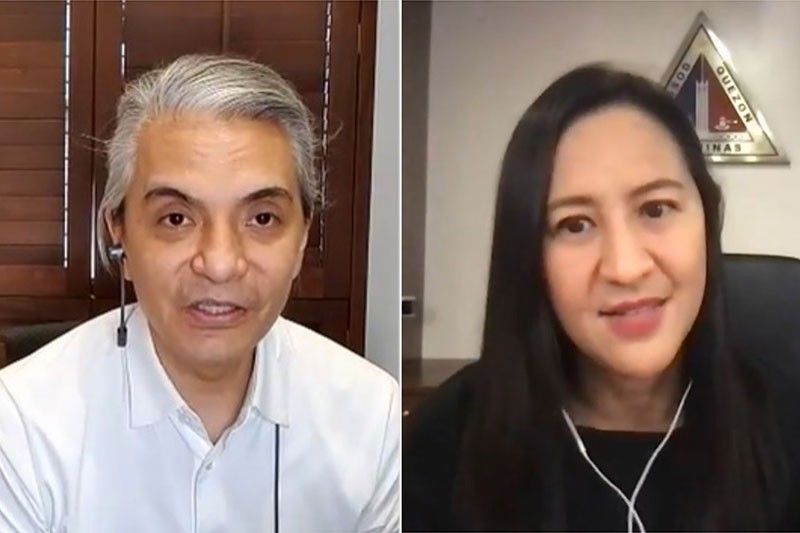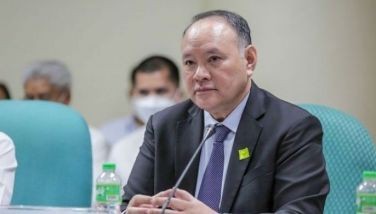No time for Charter change amid COVID-19 pandemic, Metro Manila mayors say

MANILA, Philippines (Updated 4:42 p.m.) — Amid the coronavirus pandemic, local chief executives would have no time to focus on the untimely charter change thrust in Congress as combatting the spread of the new pathogen is the bigger priority, two Metro Manila mayors opined Wednesday.
To recall, the House committee on constitutional amendments approved Speaker Lord Allan Velasco’s proposal to amend “restrictive” economic provisions in the Constitution to the tune of a 64-3-3 vote. The amendments allow Congress to tweak the constitutional restrictions on foreign investments in natural resources, public utilities, educational institutions, media, and advertising.
Speaking at the Kapihan sa Manila Bay with Marichu Villanueva press briefing, Navotas City Mayor Toby Tiangco said that charter change was the farthest thing from his mind amid the global pandemic but stopped short of making known his stand.
"Us on the local government level, we really don't have the time to think about charter change right now...I will be very honest. Whatever time we have to talk to department heads and the barangays, that is spent on just two things: worrying about the rise of COVID-19 cases, and helping our people who have been affected by economic problems brought about by the pandemic," he said in mixed Filipino and English.
"We don't have time to even read the materials that they will send to us. All I have to think about right now is COVID-19."
Quezon City Mayor Joy Belmonte, who was also present at the briefing, said for her part that she saw "the sense in economic charter change especially in these times," saying she personally felt that "a lot of provisions" in the country's charter should be reviewed.
"Other types of charter change get to be very suspicious especially when the term of the president is ending, right? If there is a genuine charter change, then this should have been brought up at the beginning of the term to appease the suspicions of the public. That's why charter change is harder to hurdle, because of the timing," the Quezon City chief executive said.
"There's an issue of suspicion and an issue of timing, and I think these things have to be taken into consideration."
The two mayors are among the litany of local chief executives who have secured vaccine deals for their constituents ahead of the rollout of the mass vaccination program by the national government and the Department of Health.
Earlier, the Department of the Interior and Local Government claimed that it had garnered "some 555,610 signatures and LGU resolutions in support of lifting the restrictive economic provisions of the Constitution."
In a statement issued later Wednesday, Sen. Leila de Lima also called on the national government to prioritize the needs of the poor over its proposed constitutional amendments amid the pandemic.
"The people are already struggling. Meanwhile, the Duterte administration is still obsessed with charter change. Despite the hardships of life and despite all the promises of the government's concern - they still put amending the Constitution first even if it is not the real problem at hand," she wrote in mixed Filipino and English.
"Do not waste the people's time and money on personal interests. Fix your priorities, Mr. President, the people have been suffering for so long. There is a sharp rise in prices and sluggish implementation of the price ceiling, and a lack of assistance for the poor in the midst of the pandemic," she also said.
The senator also called for the immediate signing of the Implementing Rules and Regulations of the Magna Carta of the Poor, which she said had remained unsigned for the better part of a year now.
Survey results by the Social Weather Stations in November suggested that almost half of Filipinos classified themselves as poor under the pandemic.
Republic Act No. 11291 was signed into law on April 12, 2019 and mandates the State in Section 2 to "adopt an area-based, sectoral and focused intervention to poverty alleviation where every poor Filipino must be empowered to meet the minimum basic need through the partnership of the Government and the basic sectors.”
It also declares as State policy the uplifting of "the standard of living and quality of life of the poor and [providing] them with sustained opportunities for growth and development."
"People have the right to long-term, sustainable solutions that will help them weather the devastating impacts of the pandemic instead of short-sighted, knee-jerk proposals that will certainly create more problems than it can solve," she said.
"What a shame! What a sham!"
— Franco Luna with a report from Xave Gregorio
Bookmark this page for updates on the Duterte administration's attempt to restart discussions on charter change. Main image by The STAR/Boy Santos
There's no time to tackle political term limits that involves Charter change, Sen. Ping Lacson says in a statement.
"Kung nun ngang mga nakaraang taon, hindi nangyari, lalo na ngayon that we only have nine session days left, not including the joint session of Congress to convene as the National Canvassing Board for President and Vice President," says Lacson, reacting to efforts in Congress to lengthen current terms of a sitting president, vice president and members of the House of Representatives.
Lacson is running for president in the May elections with Senate President Tito Sotto as his running-mate.
The House constitutional amendments committee approves in a 62-3-3 vote the proposal to amend "restrictive" provisions in the Constitution. — Xave Gregorio
Political leaders in the House of Representatives sign a manifesto of support for Speaker Lord Allan Velasco’s push to amend "restrictive" economic provisions in the Constitution. — Xave Gregorio
The Department of the Interior and Local Government says around 555,610 signatures and LGU resolutions were submitted to the House Committee on Constitutional Amendments to support the lifting of restrictive economic provisions of the Constitution.
“The DILG conducted roadshows all over the country in 2019 and last year pre-COVID and we can definitely say that there is growing public support to reforms in the 1987 Constitutions especially the lifting of restrictive economic provisions to encourage foreign capital flow and investments into the country,” says DILG Undersecretary and Spokesperson Jonathan Malaya.
“If not for COVID, we could have gathered more signatures but because the DILG turned its attention to the pandemic, we migrated our signature campaign on-line and relied on our CSO-partners starting March of 2020,” he adds.
- Latest
- Trending































